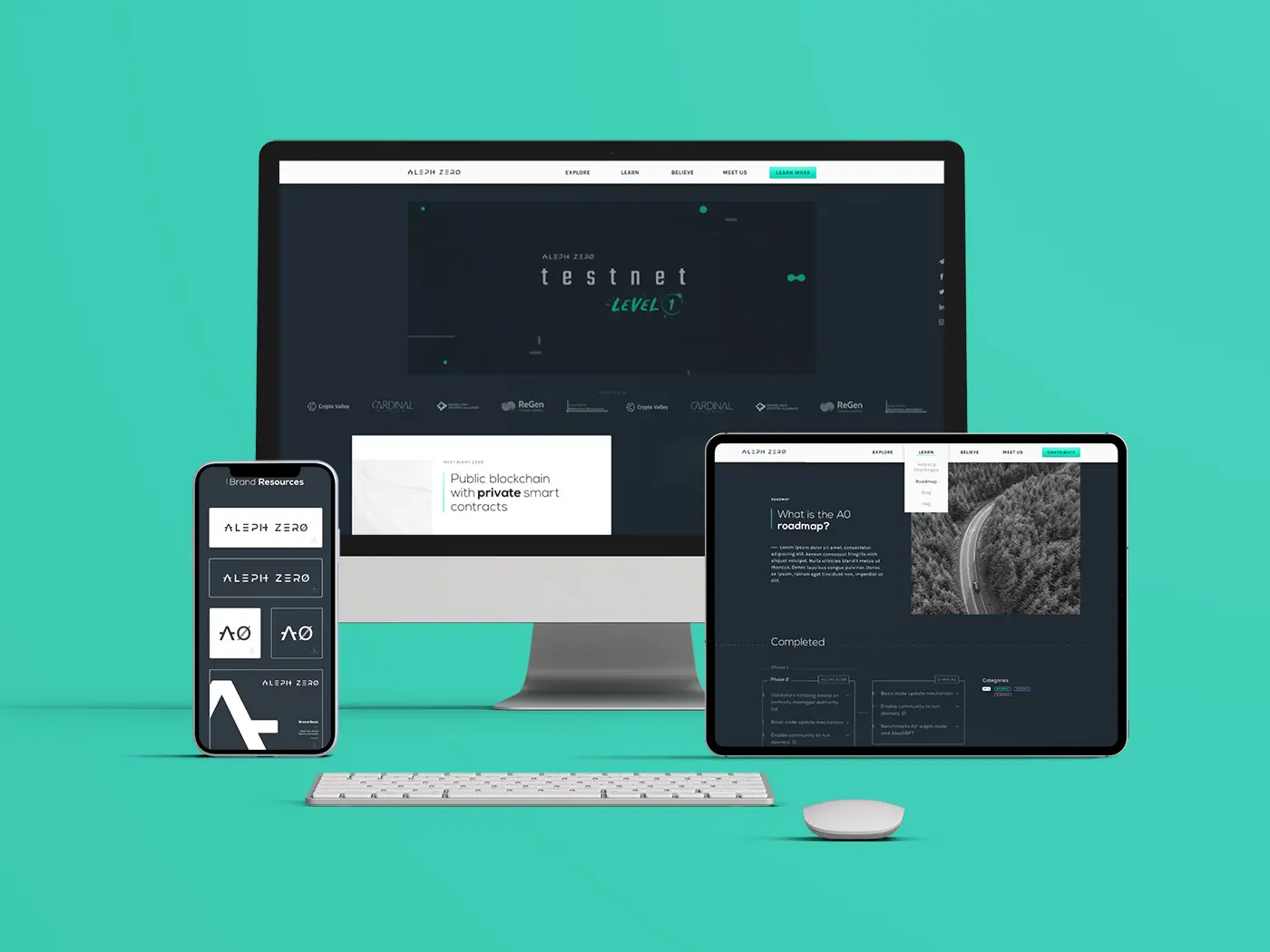Privacy Blockchain Vs Private Blockchain — an interview with Aleph Zero
26.10.2021 | 8 min read

A while ago, we wrote about moving from a private to a public blockchain. Today, we wanted to focus specifically on privacy, and draw a comparison between private blockchains, and public blockchains which feature private smart contracts. While technically these two terms have close to nothing to do with one another, they can be confusing for newcomers to the blockchain world. Let’s begin with a quick recap.
What are private blockchains?
Unlike public blockchains such as Bitcoin and Ethereum, private blockchains are permissions-based. It’s a closed ecosystem that can only be accessed by those who are granted access and it is based on trust among the nodes. However, it’s not a decentralized solution. Private blockchains are often used by companies to build multi-party business applications with high scalability within a closed environment. One example is Walmart, which has developed a private blockchain network in order to trace the provenance of all their stocked products.

The key benefits of private blockchains:
Below are some of the common benefits of private blockchains which are often cited by the companies using them:
Risk mitigation
Private blockchains can be built in full compliance with Anti-Money Laundering (AML), Know Your Customer (KYC), and Health Insurance Portability and Accountability Act (HIPAA) laws. This helps to ensure that data controllers are within certain jurisdictions. What it means is that at the moment it’s also impossible to implement public DLTs for use cases that require a controller handling specific sensitive data, and that's also one of the reasons for deploying private blockchains.
Validators cannot be anonymous on private blockchains. They are pre-selected by an organization and can therefore be trusted.
Efficiency
Because private blockchains are ‘members-only,’ they are by default, much more efficient. This stems from the fact that there are far fewer users, which means that their transaction throughput is much greater than on public networks.
Cost
On the whole, private blockchains are considered cheaper from the usage standpoint. Fees on public networks like Ethereum tend to be higher and due to the number of transactions being submitted, there are often long queues. In comparison, private blockchains, on the whole, have more controlled, lower costs.

Public blockchains and their benefits
With so many benefits, it would seem that it hardly makes sense for enterprises to use a public blockchain. Yet a survey commissioned by EY and Forrester in 2019 showed that nearly 75% of private blockchain users believe the best future path is on a public network. Why? Let’s take a look at some of the benefits of choosing a public blockchain:
An open and verifiable environment
One of the key assets of a public blockchain is its open environment. There are many benefits to this lack of restrictions. Most notably, every user has a copy of the ledger, and maintenance activities are performed from different nodes. Many public blockchains (including Ethereum) are fully decentralized. But note that IOTA deals with something called a Coordinator, which is a single node controlling the network. This means that IOTA itself is not decentralized - however, work is currently being done to work towards a fully decentralized setup.
Security
Properly designed public networks are significantly more secure than their permissioned counterparts—mainly due to a lack of a single point of failure. What’s equally important from an enterprise’s point of view is to ensure that the given network is not only decentralized but also fundamentally strong, audited by an independent external party/parties, and, ideally, peer-reviewed.

Optional privacy for sensitive data
In popular public blockchains—such as Ethereum or Bitcoin—we’re dealing with a concept of pseudonymity. While there’s no public on-chain data that can identify persons with an account, one can still reveal the transaction history between all accounts. While this level of transparency can be beneficial at times, privacy-enhancing public blockchains empower the users in making this decision, especially when we’re taking sensitive corporate data into account.
Total transparency
Public blockchains offer the full transparency that their private counterparts are unable to deliver. If you’re a user, you will have full access to the ledger at all times. Why is this important? It helps to reduce or even eliminate corruption across the network.
Enter Privacy Blockchain
So if so many private blockchain users believe that the future is in a public network, why aren’t we seeing a wider adoption of public chains by companies? The answer lies in risk. Large enterprises by their very nature are very risk-averse. But is there a way of combining the benefits of being part of a public blockchain with minimized risk? Another stumbling block is the question of how to remain compliant with GDPR. How can blockchain technology meet the growing demands for data protection?
We take a look at the example of Aleph Zero, a Proof-of-Stake public blockchain with private smart contracts built from the first principles - the definition of privacy blockchain. We’ve been working with Aleph Zero on preparing its infrastructure for a Mainnet launch.

An interview with Antoni Zolciak, COO at Aleph Zero
Could you tell us a bit more about how Aleph Zero’s blockchain works and what makes it unique?
With Aleph Zero, we’re aiming at providing a viable alternative to currently available infrastructure layers. A one-sentence pitch would be “The privacy-enhancing blockchain” but that’s just the tip of the iceberg. Our USP lies in combining the solutions for the scalability, security, and decentralization issues while enabling the builders to use a native, software-based privacy layer—which will be useful especially from an SMB/enterprise standpoint. That doesn’t mean, however, that the Aleph Zero technology can be used only for privacy-related use cases. The technology is flexible enough to operate as your typical public blockchain—just significantly faster. It can also be used for permissioned, closed deployments as an alternative to other dedicated solutions. With Aleph Zero, we’re essentially building an innovative environment, elements of which can be then used just like any other open-source stack.
Why do you think that risk is such an important driver when it comes to blockchain adoption?
It depends on what kind of a risk we’re talking about. If the issue at hand is the risk that enterprises face when deploying on a public blockchain, we do plan to establish more trust by introducing a peer-reviewed, audited, and properly decentralized blockchain. If we’re thinking of financial risk for businesses—i.e. “what can I use this for?”—then a simple pilot deployment on a small scale, in a permissioned environment, might help alleviate such concerns.
Opportunity cost, however, is now becoming an increasingly important risk factor—what happens if you don’t innovate? According to the latest Deloitte 2021 Global Blockchain Survey, nearly 80% of the respondents are of an opinion that digital assets will be very/somewhat important to their respective industries in the next 24 months. 81% of the respondents “strongly agree that blockchain technology is broadly scalable and has achieved mainstream adoption."

How will Aleph Zero comply with regulatory bodies? We know that this is one of the major challenges for blockchain technology at the moment.
The technology itself isn’t non-compliant or compliant; it’s just there. The challenges surrounding the regulatory environment relate to use cases of that technology, particularly within the data control or the digital assets space. Aleph Zero is not only an infrastructure layer from a technology standpoint, but it’s also powered by an $AZERO token—which is a native currency that ensures the governance and distribution of power within the network. In this particular case, we’ve obtained a no-action letter from the Swiss Financial Market Supervisory Authority (FINMA) that classifies $AZERO as a utility token and not a security.
When it comes to challenges related to, for instance, use cases in the healthcare field where control over sensitive data is required under GDPR, HIPAA, PIPEDA, or similar, there’s no solution yet as far as public networks are concerned. We need to have a specific Data Controller/Data Processor, and the definitions surrounding these two when blockchain is involved do not exist yet. Similarly, the same issue arises with the Right of Rectification or the Right to Erasure. That is not the case with permissioned deployments as, in essence, they act as centralized databases.
Another significant challenge lies in how privacy is perceived by the general public. While multiple mainstream companies put more and more emphasis on the matter—especially after scandals similar to Cambridge Analytica—this still remains both an educational challenge as well as an open-ended discussion. We see privacy not as a way of concealing data regardless of the circumstances, but simply as a more secure and user-friendly way for individuals to interact with third parties. The misconceptions around this idea led to intense data reselling, sometimes without the users even being aware of this fact—which the entire Web 3.0 is trying to avoid by developing new incentive models. Promoting user privacy has to do with empowering the users to have full control over their data, and to provide them with the rights to reveal the details only to proper authorities.
What are your future plans for scaling your product?
Over the last four years, we’ve been primarily focused on developing the technology itself: the consensus protocol, the smart contracts via an integration with the Substrate stack, and the design of the native privacy solution. We were also fortunate enough to receive a solid confirmation from the markets as far as our fundraising was concerned. The next step for Aleph Zero is building a broad validator community around the project, as well as engaging in building pilot deployments of the technology. While this is a general-purpose platform that can be used for any potential blockchain application, we’re interested—somewhat by default—in the financial markets, building new IT infrastructures in the emerging markets, as well as finding new use cases for the ESG/sustainability space. We trust that a scalable, yet energy-efficient blockchain infrastructure, is a perfect fit for such opportunities.
Thank you for your insightful explanation and we with you the very best of luck for the future.



